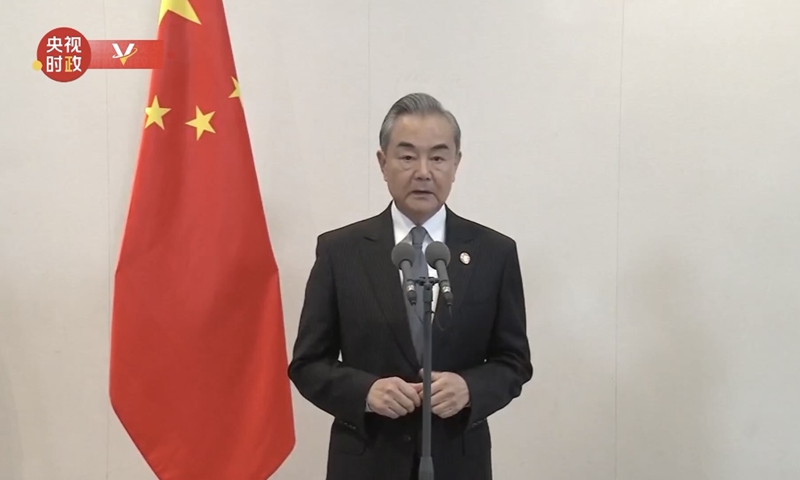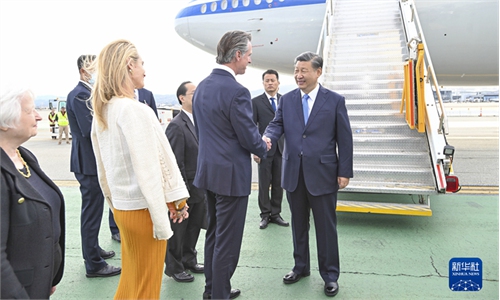Chinese and US leaders’ summit ‘strategic, historic and directional’: Chinese Foreign Minister

Chinese Foreign Minister Wang Yi. Photo: Screenshot
The two heads of state of China and the US had a comprehensive and in-depth summit at the Fioli estate, which was strategic, historic and directional, Chinese Foreign Minister Wang Yi told media on Wednesday.
The meeting was first of all strategic. US President Joe Biden extended a special invitation to President Xi Jinping for a summit that is distinct from the bilateral meetings arranged during APEC, with the US explicitly referring to it as a "summit," Wang said.
This summit's uniqueness, the level of attention from both nations as well as the international community, and the meeting's own importance all contribute to its strategic significance and profound impact, he noted.
The meeting, which was historic, took place against the backdrop of a pivotal stage in US-China relations. The international community needs a stable China-China relationship more than ever, the Chinese senior diplomat said.
President Xi's visit to the US, his first in six years, and the face-to-face meeting of the two leaders after a year underscore the historic continuity and contemporary value of US-China presidential diplomacy. This will become a milestone in the history of US-China relations and a major event in current international affairs, Wang said.
The four-hour meeting, which was fully interpreted and allowed the two leaders to exchange deep insights face-to-face, was also directional, Wang noted.
The two leaders offered guiding opinions on establishing mutual understanding, properly managing differences, and advancing dialogue and cooperation on prominent issues.
They communicated comprehensively on global challenges such as the Israeli-Palestinian conflict, the Ukraine crisis, climate change, and artificial intelligence. They further explored the proper way for the two major countries to coexist and clarified the major responsibilities shared by the US and China, Wang said.
They formed a forward-looking "San Francisco vision," setting the direction for a healthy, stable, and sustainable development of US-China relations and outlining a blueprint for the future.
During their meeting, the two leaders exchanged views in an atmosphere of mutual respect on strategic, overarching, and directional issues concerning US-China relations, as well as major issues affecting world peace and development, Wang said. President Xi comprehensively articulated China's authoritative stance on stabilizing and improving US-China relations, most importantly in the following areas:
First is to make the correct historical choice. Are China and the US partners or adversaries? Is it mutual cooperation or opposition and confrontation? This is a fundamental question where no catastrophic mistakes can be made, Wang said.
President Xi pointed out that history is the best textbook, and reality is the best sobriety check. We hope the two countries can be partners, actively collaborate on agendas that benefit both sides, and positively interact in international and multilateral venues, brightening the prospects for US-China relations, Wang said.
Second is to find the correct way to coexist. President Xi noted that despite the different histories, cultures, and social systems, it's untenable not to engage with each other, and it's unrealistic to want to change the other, and conflict and confrontation would be unbearable for everyone, Wang further expounded.
The right approach is to adhere to mutual respect, peaceful coexistence, and win-win cooperation. These three principles are not only important lessons distilled from half a century of US-China relations but also profound insights from historical conflicts among great powers, which should guide both nations' collaborative efforts, the senior diplomat said.
Third is to forge the "San Francisco vision." President Xi, with a visionary outlook, pointed out that China and the US should jointly establish correct recognition, effectively manage differences, advance mutually beneficial cooperation, shoulder major country responsibilities, and promote people-to-people exchanges. These "five commonalities" essentially lay down five pillars for the stable development of US-China relations, carving out a new vision for the future of US-China relations, Wang said.
In the media briefing, Wang said that many areas of disagreement and sensitive issues were discussed during the meeting between Xi and Biden.
President Xi stressed that China is committed to building a stable, healthy, and sustainable relationship with the US. At the same time, China has legitimate interests that must be safeguarded, principles that must be defended, and red lines that must be upheld, Wang said.
If the US persists in containing and suppressing China under the guise of competition, China will resolutely protect its sovereignty, security, and development interests, he said.
Also, the Taiwan question remains the most important and sensitive issue in China-US relations, and President Xi elaborated in detail on China's principled stance, Wang said. China demands that the US adhere to the one-China principle, oppose "Taiwan independence," stop arms sales to Taiwan, stop interfering in China's internal affairs, and support China's peaceful reunification, Wang noted.
In terms of China's position on economic and technological issues, Xi told Biden that the US policy of containment and suppression in the field of economy and technology is not about "de-risking," but isabout creating risks, Wang said.
These incorrect practices and the resulting uncertainty in China-US relations have become the greatest risk. Suppressing Chinese technology equates to containing China's high-quality development and depriving the Chinese people of their right to develop, which we will never accept or allow to succeed.
Xi also urged the US to take China's concerns seriously, lift unilateral sanctions, and provide a fair, just, and nondiscriminatory environment for Chinese enterprises, said the Chinese Foreign Minister.



